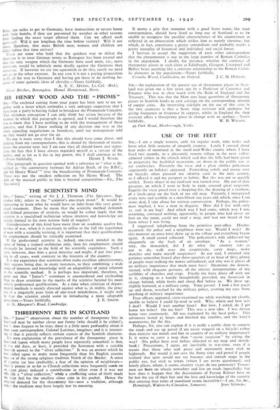THE SCIENTIST'S MIND
SIR.—" Janus," writing of Sir J. J. Thomson (The Spectator, Sep- tember 6th), refers to the " scientist's one-track mind." It would be interesting to learn what he would have us infer from this very gener- alised statement. Does he mean that the scientific method demands well-defined processes of analysis, or would he rather imply that the scientist is a specialised technician whose interests and knowledge are strictly limited to his own narrow field of inquiry?
Considerations of this kind have more than an academic quality for, in time of war, when it is necessary to utilise to the full the experience of men with a scientific training, it is important that their qualifications for employment should be critically examined.
If the professional scientist is, indeed, one-track minded in the sense of being a trained technician only, then his employment should obviously be limited to the field of his scientific experience. Such a view, however, does him a great injustice and might, if put into prac- tice in all cases, work contrary to the interests of the country.
It is my experience that scientists often make excellent administrators, their success being due, in many instances, to their combining a wide range of interests and knowledge with an adaptability of mind inherent in the scientific method. It is perhaps less important, therefore, to point out that " Janus's " statement is unconsidered and misleading than to draw attention to the merits of the scientist beyond his more strictly professional qualifications. At a time when criticism of depart- mental methods is mainly directed against what is, in reality, the prac- tice of a singularly pure form of one-track mindedness, it might well be that the scientist could assist in introducing a more adaptable
/0 Si. Margaret's Road, Cambridge. •


























 Previous page
Previous page